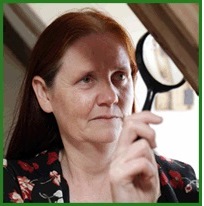
How and why did you become a genealogist?
Many professional genealogists prefer the term ‘family historian’ because we believe researching our ancestry is about what happened, why and how, i.e. local and social history, not just names and dates. This is one of the reasons I don’t describe myself as a genealogist although this is a large part of what I do. Rather, I am a historical researcher who specialises in genealogy, local history and house/property history research.
I began my career whilst completing my MA when I started work at the Norfolk Record Office as an archives assistant. My job was to conduct research for those who couldn’t visit, help the public with their own and transcribe and index records. It fitted with my academic background in history, sociology and politics and I loved the hands on research and the way it allowed me to develop my interest in social and local history.
In my spare time I researched my family’s family histories and undertook a wide range of genealogical and local history study and reading. After 6 years working at the record I left in 1997 to set up my own historical research business – Past Search. At the same time I took a Post Graduate Certificate in Education (PDCE) in the Post-Compulsory Sector (PCE), which qualifies me to teach adults. Whilst building my business I taught a number of history and humanities related subjects for organisations such as Adult Education and HM Prison Service whilst designing and developing my own family, local and house history courses and workshops from beginners to post-graduate level locally, nationally and online for various organisations.
Running my own research business allows me to earn my living at something I love as well as use my academic historical research skills.
How often do you come across a ‘brick wall’ during your research? How do you get around it?
Frequently. Brick wall research is one of my specialisms. As each case is different it is not possible to give a generic answer. The main key is being truly analytical combined with real understanding of documentary resources and local geography and history.
Where’s the farthest you had to travel during your family history research? Was it a fruitful trip?
I have travelled all over England and conducted research in most counties. I have also visited parts of Wales and Ireland. I have had different levels of success on all the visits I’ve made.
What do you think about internet only research? Is it possible to do everything on the internet?
I love the internet. The resources now online have made family history research accessible to people in a way that was unimaginable only a few years ago. However, many records can still only be accessed in record offices. It is also not possible to confirm and prove vital links before the early 19th century without buying certificates. There is also a danger that people don’t look beyond what is online or develop a real understanding of the resources that are online, thereby limiting their own research and knowledge. Nevertheless, I think the internet has enabled huge numbers of people to conduct their own research and develop an interest in historical events that would not have done so otherwise.
What are your favourite websites for family history research?
What’s the best thing about being a genealogist?
Putting all the pieces of a research project together properly, solving mysteries, making clients happy and constantly learning new things.
Have you ever regretted taking on someone’s research?
Yes.
Would you recommend genealogy as an occupation to others?
Yes.
Gill Blanchard is a professional genealogist, a member of AGRA, and a tutor at Pharos, where you can find some great genealogy courses. Gill can be contacted and hired through her website Past Search.
BA (Hons). MA. PGCE (PCE).
Author of Tracing Your East Anglian Ancestors (Pen & Sword, 2009)